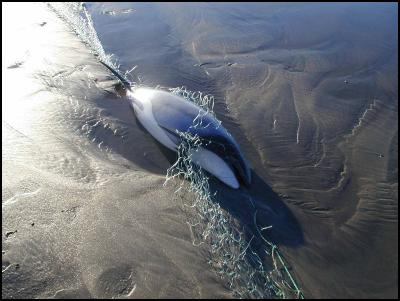Dolphin high court hearing closes
For immediate release - 18 June 2009
Dolphin high court hearing closes but fight to rescue species far from over

A fishing industry bid to strip away protection for our endangered Hector*s and Maui*s dolphins ended in the Wellington High Court yesterday, where lawyers for the Federation of Commercial Fishermen attempted to block proposed bans on set netting and inshore trawling.
Net fishing is the single biggest killer of our two endemic dolphin species. In 2007 a report released by The National Institute of Water and Atmospheric Research (NIWA) found that between 110 and 150 dolphins drown in commercial set nets alone, around New Zealand every year.
Maui*s is known as the world*s rarest marine dolphin. Only an estimated 111 still survive today. Just 7,270 of its South Island relative, Hector*s dolphin, remain from an original population of 29,000.
WWF-New Zealand, along with many other New Zealand conservation organisations, has long campaigned for the dolphins* protection.
Last May, then Fisheries Minister Jim Anderton announced regional bans on set netting, drift netting and inshore trawling to safeguard the dolphins in their dwindling range, but the law suit, led by the Federation of Commercial Fishermen, has led to more needless deaths; in May this year, another Hector*s dolphin was found drowned in a deep water set net off the Kaikoura coast.
The New Zealand public has declared their support for protecting the dolphins; 83 per cent of respondents to a Colmar Brunton poll in March last year stated they want set netting and inshore trawling banned, even if it meant some economic losses.
Last February, 53 per cent of fish consumers surveyed by Colmar Brunton said they were less likely to buy fish caught in coastal waters, because of their concern over Maui*s and Hector*s dolphins.
In November 2007, more than 32,000 people signed a WWF-led petition demanding a total ban on set nets out to in our EEZ waters, and a total ban on trawl nets in waters shallower than 100 metres.
In May 2008, the Chairs of Northland, Auckland, Waikato and Bay of Plenty regional councils, the Mayor of Rodney District and a number of councillors, called on Jim Anderton and the then Conservation Minister Chris Carter to extend the set net ban and create a northern marine mammal sanctuary.
The New Zealand public is on the side of these endangered animals, and will be watching the outcome of the legal challenge with great concern.
So will the international community; Maui*s dolphin is listed as *critically endangered* by the International Union for the Conservation of Nature, which wrote of its concerns to the then New Zealand Prime Minister Helen Clark last year. The International Whaling Commission has also expressed misgivings that, while the new protection measures are a major step forward, *additional measures are likely to be required to ensure recovery of the species.*
New Zealand has signed several international treaties, such as the United Nations Convention on Biological Diversity, which oblige it to spare the dolphins from extinction. They are also supposed to be protected by the Marine Mammal Protection Act.
A small section of the fishing industry and its lawyers must not be allowed to prevail over the will of the New Zealand public, and the binding legislation that is supposed to protect our taonga, said WWF-New Zealand Marine Programme Manager, Rebecca Bird.
*Even if these protection measures survive the fishing industry challenge, they are only enough to slow the dolphins* decline. We still lack any clear plan to build up their numbers again.
*Instead of talking about watering down protection for the dolphins,* she said, *we should be urgently preparing a Species Recovery Plan, as New Zealand's own laws oblige us to do. WWF calls on the government to make an immediate commitment to the recovery of Hector's and Maui's dolphins to at least their 1970 levels.*
ENDS


 Gordon Campbell: On Budget 2025
Gordon Campbell: On Budget 2025 Rainbow Wellington: Rainbow Wellington Concerned By Reports Of Increased Abuse
Rainbow Wellington: Rainbow Wellington Concerned By Reports Of Increased Abuse ACT New Zealand: David Seymour's Budget Day Speech 2025
ACT New Zealand: David Seymour's Budget Day Speech 2025 Government: Minister Of Finance’s Budget 2025 Speech
Government: Minister Of Finance’s Budget 2025 Speech The Prosperity Deal: Govt Budget Has No Plan For AI Job Loss – Citizens Launch The Prosperity Deal As The Only Workable Alternative
The Prosperity Deal: Govt Budget Has No Plan For AI Job Loss – Citizens Launch The Prosperity Deal As The Only Workable Alternative Greenpeace New Zealand: Greenpeace Braced For ‘Scorched Earth’ Budget From Govt
Greenpeace New Zealand: Greenpeace Braced For ‘Scorched Earth’ Budget From Govt NZ Police: Police Acknowledge Sentencing Of Donald Sarratt In Child Sexual Abuse Material Case
NZ Police: Police Acknowledge Sentencing Of Donald Sarratt In Child Sexual Abuse Material Case


